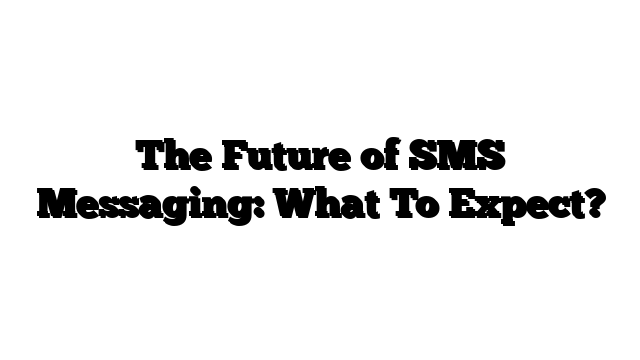Short Message Service (SMS) has established itself as a dependable and widely used method of information exchange in the rapidly changing field of communication technologies. It is interesting to think about what the future holds for SMS texting as you approach the dawn of a new era. Emerging trends, shifting consumer habits, and technological developments all influence how this essential communication medium develops.
Enhanced Multimedia Integration
The seamless integration of multimedia components is one of the advancements that is projected to take place in the future of short message service (SMS) messaging. Traditional short message service (SMS) relies mostly on plain text, but the future promises to provide a more immersive and interesting experience. The integration of music files, films, and images into SMS is expected to revolutionize the way users connect with one another. In a digital world that is driven by social media and multimedia platforms, this progression is in line with the increased desire for material that is visually attractive.
Rise of Rich Communication Services (RCS)
The development of SMS messaging has seen the emergence of Rich Communication Services (RCS), which is a significant competitor. A more dynamic and engaging communication experience is provided by RCS, in contrast to the traditional SMS. It enables features like read receipts, typing indicators, and the ability to transmit high-quality media. Users should expect a messaging platform that is more feature-rich and versatile, comparable to over-the-top (OTT) messaging apps, as mobile carriers and device makers increasingly adopt RCS.
Personalized and Contextual Messaging
The future of short message service (SMS) messaging is expected to be highly tailored and aware of the environment in which it is being sent. Businesses and service providers will have the capacity to develop communications that are personalized to the interests and habits of individual customers by utilizing advanced analytics and artificial intelligence. In an era that is defined by an abundance of information, this change from generic broadcast messages to highly tailored content ensures that short message service (SMS) will continue to be an effective and relevant channel for communication.
Chatbots and Automated Interactions
Chatbots and other forms of automated interaction are becoming increasingly integrated into SMS texting, which is gaining momentum. These technologies are being adopted by businesses at an increasing rate in order to better streamline interactions with customers and give rapid responses. A channel that facilitates efficient customer support, appointment booking, and order tracking is the short message service (SMS). This trend not only improves the user experience but also has the potential to contribute to the optimization of business operations through the use of automation.
Security and Two-Factor Authentication (2FA)
Considering the increasing importance placed on digital security, it is anticipated that short message service (SMS) messaging will play a crucial part in the authentication processes. Two-factor authentication (2FA) using text messages is becoming increasingly popular due to the ease of use and efficiency it offers. SMS authentication is likely to become even more sophisticated as the risks to cybersecurity continue to increase.
Geo-Targeted and Location-Based Messaging
The development of location-based services that make use of geospatial data is something that the future of short message service (SMS) messaging stands to benefit from. With the use of this feature, businesses are able to give users communications that are specifically tailored to their area based on their geographical location. It is possible for location-based SMS messaging to generate hyper-targeted and relevant communication, which can lead to an increase in engagement and effectiveness. This can be accomplished by advertising local discounts, offering directions, or enhancing event experiences.
Integration with Marketing Strategies
SMS is still a powerful instrument in the marketing toolbox. In the future, SMS messaging will be seamlessly integrated with all-encompassing marketing techniques. Marketers will send customized promotional information, limited-time offers, and time-sensitive discounts by utilizing the personalized and interactive characteristics of SMS. Use experienced services of SMS marketing from expert firms that will ensure that companies successfully reach their target audience in the increasingly competitive digital world.
Conclusion
SMS messaging is set to undergo a significant transformation in the future. SMS continues to be a flexible and reliable communication method, even with the introduction of chatbots, personalized messaging, and multimedia integration. A more interesting and feature-rich SMS experience is what businesses and users can anticipate, guaranteeing SMS’s continued relevance in the rapidly changing world of digital communication.
James Martin is a passionate writer and the founder of OnTimeMagazines & EastLifePro. He loves to write principally about technology trends. He loves to share his opinion on what’s happening in tech around the world.


